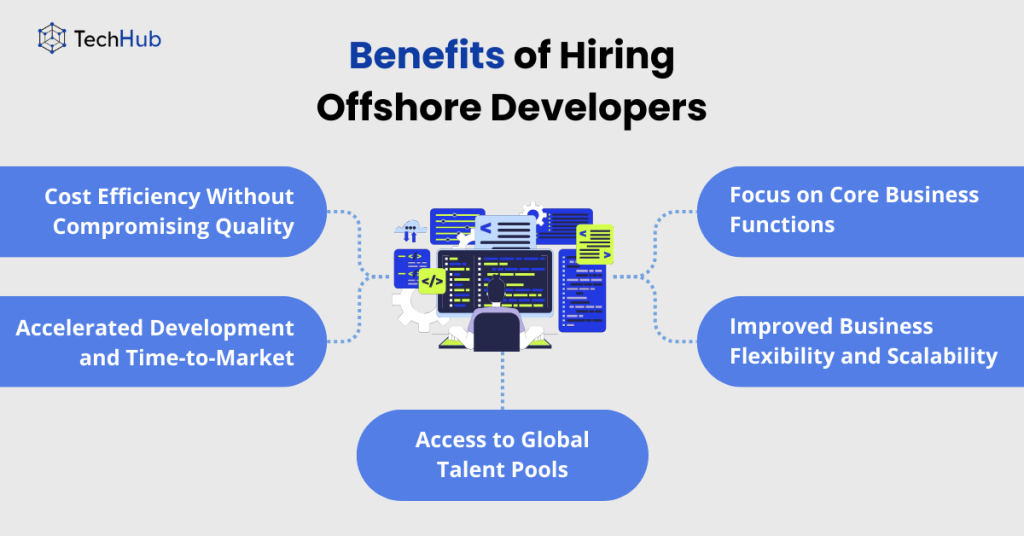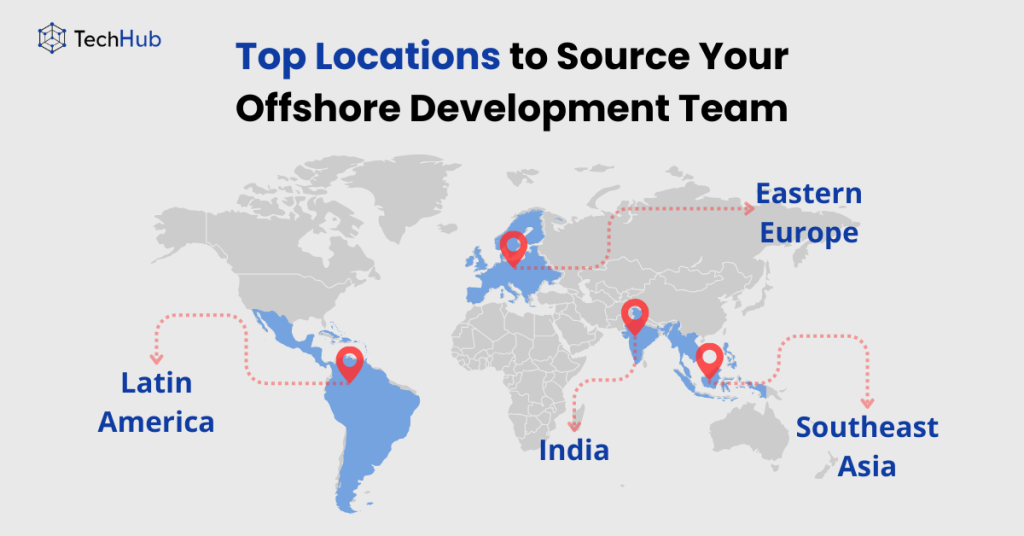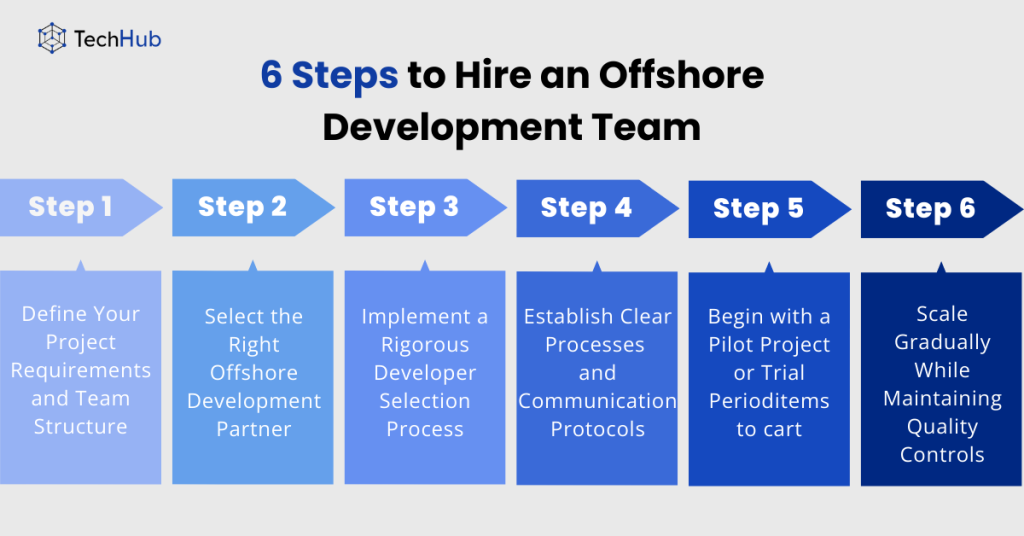Hire Offshore Developers: A Complete Guide to Scale Smarter
Looking to extend your technical capabilities while managing costs? Hiring offshore developers offers access to global talent pools, significant cost savings, and scalable teams. This comprehensive guide covers everything from selecting ideal locations to evaluating specialized skills and managing remote teams effectively.

- 1. Benefits of Hiring Offshore Developers
- 2. Top Locations to Source Your Offshore Development Team
- 3. Key Technologies: How to Hire Offshore Developers for Specialized Skills
- 4. 6 Steps to Hire an Offshore Development Team
- 5. How Much Does It Cost to Hire Offshore Developers?
- 6. TechHub Asia: Your Partner for Offshore Development Solutions
- 7. Conclusion
1. Benefits of Hiring Offshore Developers
In today’s competitive tech landscape, businesses face constant pressure to innovate rapidly while managing development costs. Hiring offshore developers has emerged as a strategic solution that addresses both challenges effectively. Companies ranging from startups to enterprise-level organizations are increasingly turning to offshore development teams to gain a competitive edge through resource augmentation.

Cost Efficiency Without Compromising Quality
Perhaps the most compelling reason to hire offshore developers is the significant cost advantage. Businesses can typically reduce development costs by 40-70% compared to hiring domestic talent. This cost efficiency stems from differences in living costs and salary expectations across global regions rather than quality disparities.
For example, hiring offshore PHP developers or offshore Java developers in regions like Eastern Europe or Southeast Asia can result in savings of $30,000-$50,000 per developer annually compared to North American or Western European rates. These savings extend beyond basic salaries to include reduced overhead costs:
- Lower office space requirements
- Reduced recruitment and training expenses
- Decreased employee benefits costs
- Elimination of hardware and infrastructure investments
Importantly, these cost benefits don’t necessitate quality compromises when working with established offshore development providers who maintain rigorous quality standards and technical expertise.
Access to Global Talent Pools
When you hire offshore developers, you immediately expand your talent search globally rather than being limited to your local market. This provides several distinct advantages:
- Specialized expertise: Access to developers with niche skills that may be limited in your domestic market
- Broader selection: Choose from a larger pool of candidates for specific roles
- Diversity of perspective: Incorporate varied approaches to problem-solving and innovation
- Reduced competition: Avoid competing with local companies for the same limited talent pool
Accelerated Development and Time-to-Market
Working with offshore development teams can significantly compress development timelines through:
- Time zone advantages: Implementing “follow-the-sun” development models where work continues around the clock
- Faster recruitment: Reducing hiring timelines from months to weeks with pre-vetted talent pools
- Parallel development tracks: Maintaining multiple development streams simultaneously
- Scalable resources: Quickly adding team members as project requirements evolve
Focus on Core Business Functions
By choosing to hire an offshore development team, organizations can redirect internal resources toward core business priorities:
- In-house technical teams can focus on strategic initiatives rather than routine development
- Leadership can allocate more attention to market positioning and customer experience
- Innovation becomes more attainable with dedicated resources for exploration and R&D
- Internal teams can maintain closer alignment with evolving business objectives
This strategic reallocation of resources often results in enhanced business outcomes across multiple fronts simultaneously.
Improved Business Flexibility and Scalability
The ability to scale teams up or down rapidly represents another key benefit when you hire offshore developers as a staff augmentation solution:
- Project-based scaling: Add specialized talent for specific project phases
- Rapid expansion: Grow development capacity quickly during high-demand periods
- Risk mitigation: Reduce financial commitments during uncertain market conditions
- Technology exploration: Test new technical directions without substantial permanent investment
This flexibility proves particularly valuable for businesses with fluctuating development needs or those navigating evolving market conditions.
2. Top Locations to Source Your Offshore Development Team
When looking to hire offshore developers, understanding the strengths and characteristics of different regions can help you make strategic decisions aligned with your specific needs. Many organizations benefit from understanding the key differences between offshore staffing vs outsourcing models when making these decisions.

Southeast Asia: Emerging Talent and Cost Efficiency
Countries like Vietnam, Philippines, and Malaysia are gaining prominence for offshore development, offering:
- Growing technical capability: Rapidly improving technical education and infrastructure
- Exceptional value: Developer rates averaging $20-$35 per hour
- Government support: Strong governmental backing for tech sector development
- Cultural adaptability: Increasing Western business practice alignment
- English communication: Varying but improving English proficiency
This region often represents an ideal balance for companies wanting to hire offshore developers with solid skills at highly competitive rates.
Latin America: Nearshore Advantages for North American Companies
For North American businesses, Latin American countries like Argentina, Brazil, and Mexico offer compelling nearshore benefits:
- Time zone alignment: Overlapping business hours facilitate real-time collaboration
- Cultural proximity: Similar business practices and communication styles
- Geographical convenience: Easier on-site visits when necessary
- Technical sophistication: Strong capabilities in web and mobile development
- Language capabilities: Growing English proficiency alongside Spanish/Portuguese
India: Scale and Comprehensive Service Offerings
India remains the largest offshore development market globally, with a mature ecosystem that offers:
- Enormous talent pool: Over 5 million tech professionals with diverse specializations
- End-to-end capabilities: From basic coding to complex system architecture
- Established processes: Mature quality assurance and project management frameworks
- Cost advantages: Developer rates typically range from $20-$40 per hour
- English fluency: Strong English language skills throughout the workforce
Eastern Europe: Technical Excellence and Cultural Alignment
Countries like Ukraine, Poland, Romania, and Belarus have established themselves as premier destinations for those seeking to hire offshore development teams, particularly for complex technical projects.
Key advantages include:
- Strong technical education: Rigorous STEM education systems producing over 60,000 tech graduates annually
- Advanced expertise: Particularly strong in Java, PHP, and system architecture
- Cultural compatibility: Business practices and communication styles align well with Western expectations
- Reliable infrastructure: Modern technical infrastructure and stable internet connectivity
- English proficiency: Generally high English proficiency, particularly among tech professionals
Factors to Consider When Choosing a Location
When evaluating where to hire offshore developers, consider these factors beyond just hourly rates:
- Time zone compatibility with your core business hours
- Communication infrastructure reliability
- Intellectual property protection regulations
- Political and economic stability
- Technical specialization strengths in your required technologies
- Cultural alignment with your organization’s working style
The optimal location varies based on your specific priorities – whether that’s maximizing cost savings, ensuring seamless communication, or accessing specialized technical expertise.
3. Key Technologies: How to Hire Offshore Developers for Specialized Skills
Different technical needs require specific approaches when hiring offshore talent. Here’s guidance for engaging developers in several high-demand specializations:
How to Hire Offshore Laravel Developers
Laravel has become one of the most popular PHP frameworks for web application development. When looking to hire offshore Laravel developers, focus on:
- Experience with Laravel’s ecosystem: Look for familiarity with Eloquent ORM, Blade templating, and Laravel’s authentication systems
- Understanding of MVC architecture: Ensure solid grasp of Model-View-Controller principles
- Database optimization skills: Particularly important for Laravel applications
- Testing capabilities: Experience with PHPUnit for Laravel applications
- API development experience: For building robust Laravel-based services
How to Hire Offshore PHP Developers
PHP powers approximately 79% of websites with a known server-side language, making PHP developers consistently in high demand. When looking to hire offshore PHP developers:
- Verify experience levels: PHP has evolved significantly; ensure developers know modern PHP practices
- Framework proficiency: Beyond Laravel, look for experience with Symfony, CodeIgniter, or CakePHP
- Security awareness: PHP applications face specific security challenges requiring knowledgeable developers
- Performance optimization: PHP code efficiency significantly impacts application performance
- CMS experience: For projects involving WordPress, Drupal, or similar systems
How to Hire Offshore Java Developers
Java remains critical for enterprise applications, Android development, and backend systems. When seeking to hire offshore Java developers:
- Enterprise experience: Look for familiarity with Spring Boot, Hibernate, and enterprise patterns
- Scalability focus: Java is often chosen for scalable applications, so prioritize this expertise
- Testing discipline: Strong Java developers embrace comprehensive testing practices
- Cloud deployment knowledge: Experience deploying Java applications in cloud environments
- Concurrency handling: Understanding of Java’s concurrency capabilities for robust applications
How to Hire Offshore Python Developers
Python’s versatility across web development, data science, and AI makes these developers highly sought-after. When looking to hire offshore Python developers:
- Specialization areas: Determine if you need web development (Django/Flask) or data science (NumPy/Pandas) expertise
- Version proficiency: Ensure familiarity with Python 3.x and modern Python practices
- Framework experience: Verify knowledge of relevant frameworks for your specific needs
- API development: For backend systems, prioritize RESTful API development experience
- Performance awareness: Though Python has performance limitations, developers should understand optimization
4. 6 Steps to Hire an Offshore Development Team
Implementing a structured approach when you hire offshore developers significantly improves outcomes. Follow these six proven steps:

Step 1: Define Your Project Requirements and Team Structure
Begin with absolute clarity regarding what you need:
- Document technical specifications: Create detailed requirements for functionality, architecture, and technologies
- Define team composition: Determine roles needed (developers, QA specialists, project managers)
- Establish seniority requirements: Decide the mix of junior, mid-level, and senior developers
- Clarify development methodology: Specify your preferred approach (Agile, Scrum, etc.)
- Outline communication expectations: Define reporting structures and communication frequency
This foundational step ensures alignment throughout the hiring process and prevents mismatched expectations.
Step 2: Select the Right Offshore Development Partner
Unless you’re planning to build your own offshore entity, selecting the right development partner to hire a coder is crucial:
- Research reputation: Review testimonials, case studies, and independent platforms like Clutch
- Verify technical expertise: Ensure demonstrated experience in your required technologies
- Assess communication capabilities: Evaluate responsiveness during preliminary discussions
- Check security practices: Confirm data protection and intellectual property safeguards
- Review team stability: Investigate developer retention rates and team continuity
Request client references and speak directly with current customers to validate the provider’s capabilities before proceeding.
Step 3: Implement a Rigorous Developer Selection Process
When you hire offshore developers, maintain the same quality standards you would apply locally:
- Resume screening: Filter candidates based on relevant experience and qualifications
- Technical assessments: Administer coding tests or challenges specific to project needs
- Multiple interview rounds: Include technical interviews, cultural fit discussions, and situational questions
- Team compatibility: Involve existing team members in the interview process
- English proficiency evaluation: Assess communication capabilities in your business language
Many offshore development partners offer “right to reject” provisions allowing you to request replacement developers if initial selections don’t meet expectations.
Step 4: Establish Clear Processes and Communication Protocols
Set up structured frameworks before development begins:
- Project management tools: Implement shared tools like Jira, Asana, or Monday.com
- Code repository practices: Define Git workflows and code review processes
- Documentation standards: Establish expectations for code documentation
- Meeting cadence: Schedule regular stand-ups, sprint planning, and review sessions
- Communication channels: Define primary and emergency communication methods
These processes create predictability and transparency that significantly improve offshore collaboration outcomes.
Step 5: Begin with a Pilot Project or Trial Period
Before full-scale engagement:
- Define a discrete pilot project: Select a contained initiative with clear deliverables
- Establish evaluation criteria: Set specific metrics for judging success
- Implement regular checkpoints: Schedule frequent reviews during the trial period
- Gather feedback broadly: Include input from all stakeholders interacting with the offshore team
- Document lessons learned: Capture insights to apply to the expanded engagement
This approach reduces risk and provides an opportunity to refine processes before larger commitments.
Step 6: Scale Gradually While Maintaining Quality Controls
As you expand your offshore development team:
- Integrate incrementally: Add team members gradually rather than in large groups
- Assign mentors: Pair new offshore developers with experienced team members
- Maintain knowledge transfer: Document processes and share institutional knowledge
- Preserve cultural integration: Continue team-building activities across locations
- Revisit processes regularly: Refine communication and project management approaches based on experience
Organizations that follow these methodical steps when they hire offshore developers experience significantly higher satisfaction rates and development outcomes.
5. How Much Does It Cost to Hire Offshore Developers?
Understanding offshore development costs requires looking beyond basic hourly rates to consider the total investment and return value. Offshore developer rates vary significantly by location:
| Region | Junior Developer | Mid-level Developer | Senior Developer |
|---|---|---|---|
| Southeast Asia | $15-20 | $20-35 | $35-50 |
| India | $15-25 | $25-40 | $40-60 |
| Latin America | $25-35 | $35-50 | $50-70 |
| Eastern Europe | $25-35 | $35-55 | $55-80 |
| North America (comparison) | $60-80 | $80-120 | $120-200+ |
| Western Europe (comparison) | $50-70 | $70-100 | $100-170 |
These ranges reflect general market conditions, with rates varying based on specific technologies. For example, specialized skills like AI development or blockchain expertise typically command premium rates regardless of location.
6. TechHub Asia: Your Partner for Offshore Development Solutions
At TechHub Asia, we’ve refined the process of helping companies hire offshore developers through years of successful client partnerships across industries. Our approach combines technical excellence with process discipline to deliver predictable, high-quality outcomes.
Technology Specializations
TechHub Asia offers particular expertise when you need to:
- Hire offshore Laravel developers: Our Laravel Center of Excellence maintains over 50 certified developers
- Hire offshore PHP developers: 120+ PHP specialists across frameworks and applications
- Hire offshore Java developers: Enterprise-grade Java experts for complex system development
- Hire offshore Python developers: Both web development and data science specialists
Our technical communities of practice ensure continuous skill development and knowledge sharing across these specialized domains.
Success Stories: Offshore Development in Action
Our clients have achieved remarkable results through offshore development partnerships:
- Telemedicine Solution: Leveraged offshore Python developers to build a HIPAA-compliant platform connecting patients with healthcare providers in real-time.
- Ride-Hailing Application: Employed offshore PHP and Laravel developers to build sophisticated route optimization algorithms and real-time tracking features, enabling our client to scale to 10,000+ daily rides within six months of launch.
These outcomes demonstrate the transformative potential when organizations effectively hire offshore development teams with the right partner.
7. Conclusion
The decision to hire offshore developers represents a strategic opportunity to transform your development capabilities while optimizing resource allocation in today’s competitive landscape. As global technology talent shortages persist, offshore development delivers both cost efficiency and expanded capabilities, with different regions offering varying advantages in expertise and collaboration models.
Success requires structured hiring approaches, careful partner selection, and looking beyond hourly rates to consider total value creation. To begin your offshore development journey, assess your challenges, identify needed skills, evaluate suitable locations, research qualified partners, and start with a pilot project.


